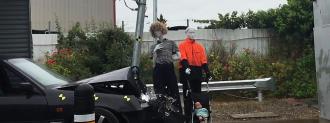Australian researchers are developing an impact-absorbing traffic light pole they hope will save the lives of drivers and pedestrians, while also cutting repair costs following car crashes.
The challenge: Traffic light poles are usually rigid steel tubes, so if you crash into one with your car, you can do serious damage to the vehicle and possibly yourself.
If you hit one really hard, it may snap and fall over, potentially destroying property or harming pedestrians, other drivers, or you on the way down.
“We expect these new energy-absorbing traffic lights will be the standard model going forward.”
Mohammad Uddin
In any case, the damaged pole then needs to be repaired or possibly replaced.
“Recent statistics show that in Australia, traffic light collisions cost $18.5 million a year in fatalities, $53.7 million for injuries, and up to $16 million annually to repair, install, and maintain traffic lights,” University of South Australia researcher Mohammad Uddin said in a press release.
The idea: With the help of the company Impact Absorbing System and a $100,000 federal grant, Uddin is now working to develop a better traffic light pole.
The design sees the pole placed in a cone-shaped hole rather than a cylindrical one. The bottom of the hole is the same width as the pole, while the top is wider, and the extra space around the pole is filled up with a polyurethane foam.
This foam is stiff enough to hold the traffic light pole upright, but if a car hits the pole, the foam compresses and absorbs some of the impact. This is likely to minimize damage to both the car and the pole, with the pole tilting when it might otherwise break or fall.
Looking ahead: The researchers have already tested out their traffic light pole design and plan to spend the next 12 months further refining it, determining the best materials and manufacturing process.
“We expect these new energy-absorbing traffic lights (EATL) will be the standard model going forward, not only for new installations but also to gradually replace existing lights,” Uddin said.
We’d love to hear from you! If you have a comment about this article or if you have a tip for a future Freethink story, please email us at [email protected].






